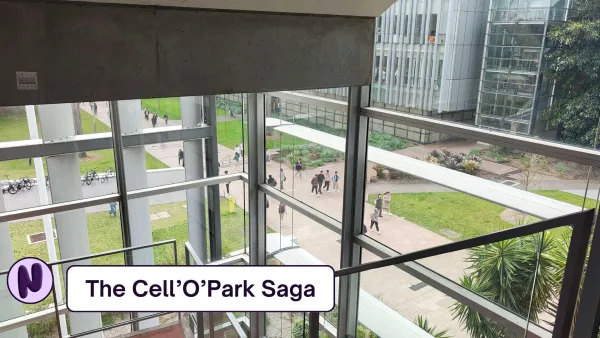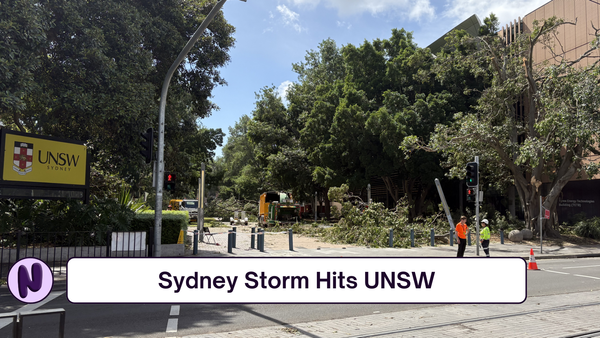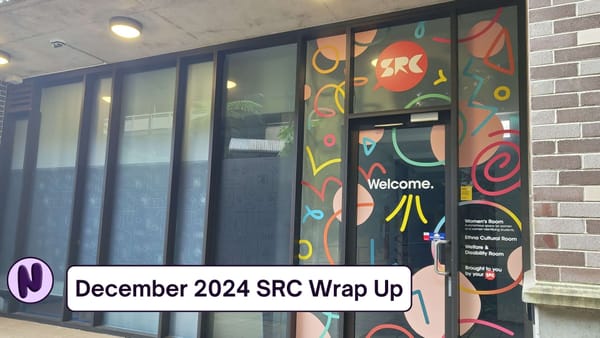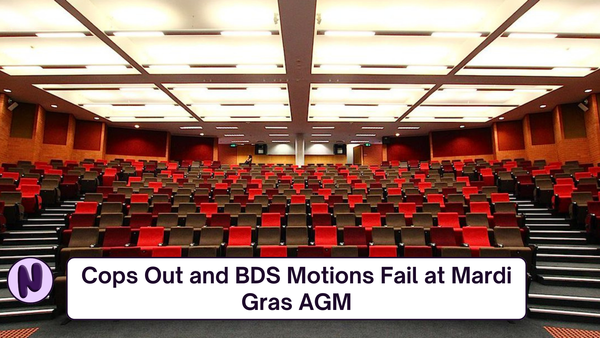How UNSW's new campus policy fucks over activists
Conroy discusses the impact of UNSW’s new “campus policy” on student activism and free speech.
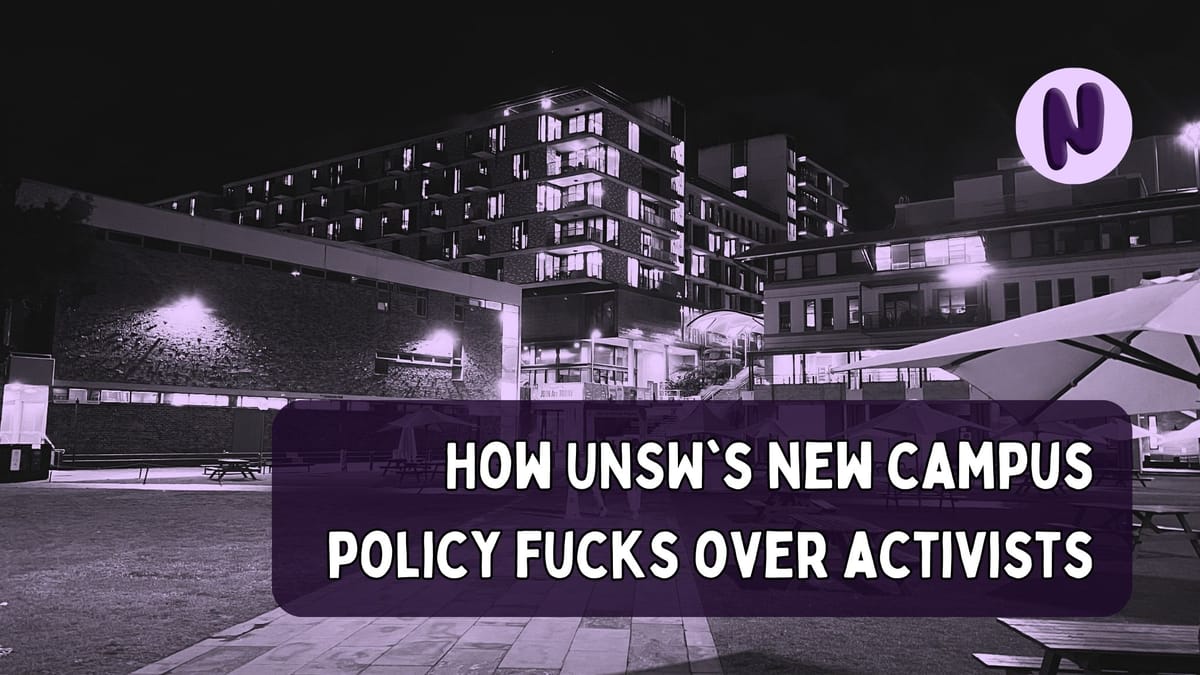
On the 1st of July, the University of Sydney quietly passed their new Campus Access Policy. It included a range of anti-protest measures, including providing 72 hour notice for certain actions, including usage of megaphones, amplifiers, projections, or banner drops, requiring that demonstrations be held in open places, and listing camping as an unacceptable activity.
The University of Sydney's changes to access policy received wide condemnation including from the NSW Council of Civil Liberties, and Amnesty Australia, and have seen students organise a major day of action against the policy, through their “Unauthorised Stalls Day”, with many clubs and societies signing on to collectively breach the new policies in protest.
However, with little to no consultation, UNSW quietlty passed their own “Campus Policy” months ago, which began to take effect on the 28th of May.
The new policy was added as a supplement to the formerly titled “Student Code of Conduct”, which itself was renamed to “Code of Conduct and Values.” Importantly, it no longer focuses on dictating policy for students, but wider visitors on campus. Similarly to the University of Sydney, UNSW has stated that the Inclosed Lands and Protection Act 1901 (NSW) applies to all University premises, providing a legal excuse for their increased scrutiny towards protestors.
The new provisions contain several measures which crackdown on rights to protest. New measures firstly require that “unobstructed access is required at all times to and from campus building.” Obstruction has long been used as a tactic by activists and protestors, employed throughout the sit-ins in the US, and South African Civil rights movements, as well as in opposition to the Vietnam War. When such policies are breached, the new provisions legitimise harsh use of force, stating that “UNSW Security or NSW Police may remove any obstructions”.
The policy provides that demonstrations cannot be conducted “inside buildings.” This severely limits the scale of protests that may be conducted by students. Furthermore, the policy requires protests to be “orderly” and “peaceful”, and that they “do not disrupt, limit, or prevent others from going about their normal business”. This drastically limits the ability for students to conduct effective and meaningful actions.
This essentially bans the use of student encampments, stating that “sleeping or living arrangements on campus is not permitted at any time and is a breach of this policy. This includes sleeping in vehicles on campus, setting up beds or tents, the use of blankets, pillows or sleeping bags, moving furniture or other University property, or creating other living arrangements, temporary or permanent at any time of day.”
Encampments have been a historical vehicle used by students across the world, achieving strong success in fighting apartheid South Africa.
The policy requires that demonstrators act in accordance with the Anti-Racism and Anti-Religious Vilification Policy, which lists the International Holocaust Remembrance Alliance (IHRA) working definition of antisemitism in the “supporting information regarding… religious vilification” tab. It has been widely criticised for conflating anti-zionism with anti-semitism, including by some of its authors. Although it is not included in the technical definition provided in the policy, there is uncertainty as to whether Pro-Palestine actions on campus will be allowed, or cracked down upon. Furthermore, the policy provides that demonstrators must provide the university with 48 hours notice before any demonstration, further inhibiting the ability for students to protest. Finally, the University authorises ‘assistance from police’ when it ‘reasonably believes’ UNSW staff cannot manage a ‘potential incident.’ Given that the provisions neither define what reasonable means, nor what an incident is, this provides the University with very wide discretion to allow Police to interfere with student actions.
The new policies impede upon rights to free speech. It gives the University the right to remove any advertising and promotional material which breaches the Promotional and Advertising Guidelines for UNSW Campuses. Those guidelines were passed in November 2023, also with little attention.
Firstly, this includes any posters from groups unaffiliated with Arc or UNSW. Given that Arc has previously suspended club status to activist groups, and operates almost every other student organisation on campus, this tool provides powerful leverage to prevent postering from occurring.
Secondly, it only allows flyers “associated with events and activities for affiliated clubs, societies, or organisations” to be handed out. Given that activist demonstrations are rarely organised in student spaces, it essentially restricts student’s ability to communicate wider protests and actions.
Students have already seen this crackdown occur in front of them. Students against War, an activist group on campus recently posted a video they filmed of a staff member taking down a photo in front of them, commenting that it was “manifestly absurd” for “notice boards to exclusively communicate events held by organisations with formal links to UNSW”. A spokesperson for SAW, upon reaching out, also said
“It is clear UNSW was targeting pro-Palestine materials in a desperate attempt to cover up its ties to Israel's genocide. UNSW has investments in multiple weapons manufacturing companies, including developing research for Lockheed Martin’s Hypersonic control system for missiles, UNSW Engineering developing munitions for Boeing, and involving undergraduate students in the process of developing IP for Quickstep through their Hype X program, creating parts for F-35 fighter jets in Bankstown—All companies that have armed Israel’s genocide.”
Cherish Kuehlmann, a long term activist at UNSW, and current SRC Education Officer, said
“I've postered for rallies and organised speakouts outside the main library for years regarding LGBTI+ rights, Indigenous rights, course cuts, housing justice and so on - with no issues from security. The adoption of these new regulations demonstrates UNSW is seeking to limit and police political expression on campus. Posters for many rallies such as Invasion Day protests are provided to students by community campaigns which often don’t have a UNSW or Arc affiliation on it. For UNSW to daily enforce the removal of independent activist posters is an attack on this kind of independent activism.
UNSW has statues of Gandhi, Martin Luther King, and Nelson Mandela in front of the main library. These important figures led mass civil disobedience and protest movements against historic injustices that, by necessity, disrupted ‘business as usual.’ Disrupting business as usual is the definition of an effective protest. The commemoration of people like MLK while restricting protest and free speech on campus is hypocritical. Students shouldn't need permission to hold a peaceful speakout in front of the library. We don't have the same power management or the government have, so how else are students and the marginalised meant to have their voices heard? That’s why globally staff and students have an important history of activism on campuses. Protest and freedom of speech is an important part of any democracy.”
Gina Elias, the current convenor of UNSW Students for Palestine and the UNSW SRC’s Environment Officer, was also broadly critical of the policy when we reached out for comment. She said that
“Students should not have to ask permission of the university to hold a rally or talk to other students; this is free speech! I think UNSW is trying to silence growing opposition to Israel’s genocide, because universities are being held to account for their complicity. This makes the democratic right to protest and hold powerful institutions to account even more crucial to a healthy democracy. Students have held even more disruptive mass climate strikes before, without the same threats from the university. UNSW’s restrictions indicate that they want to distract from rather than act on students’ demands for divestment. We refuse to be intimidated into silence! Fortunately, we know we have a lot of support from students, staff and the public. Hundreds have signed petitions demanding divestment and many more protested against this genocide.”

